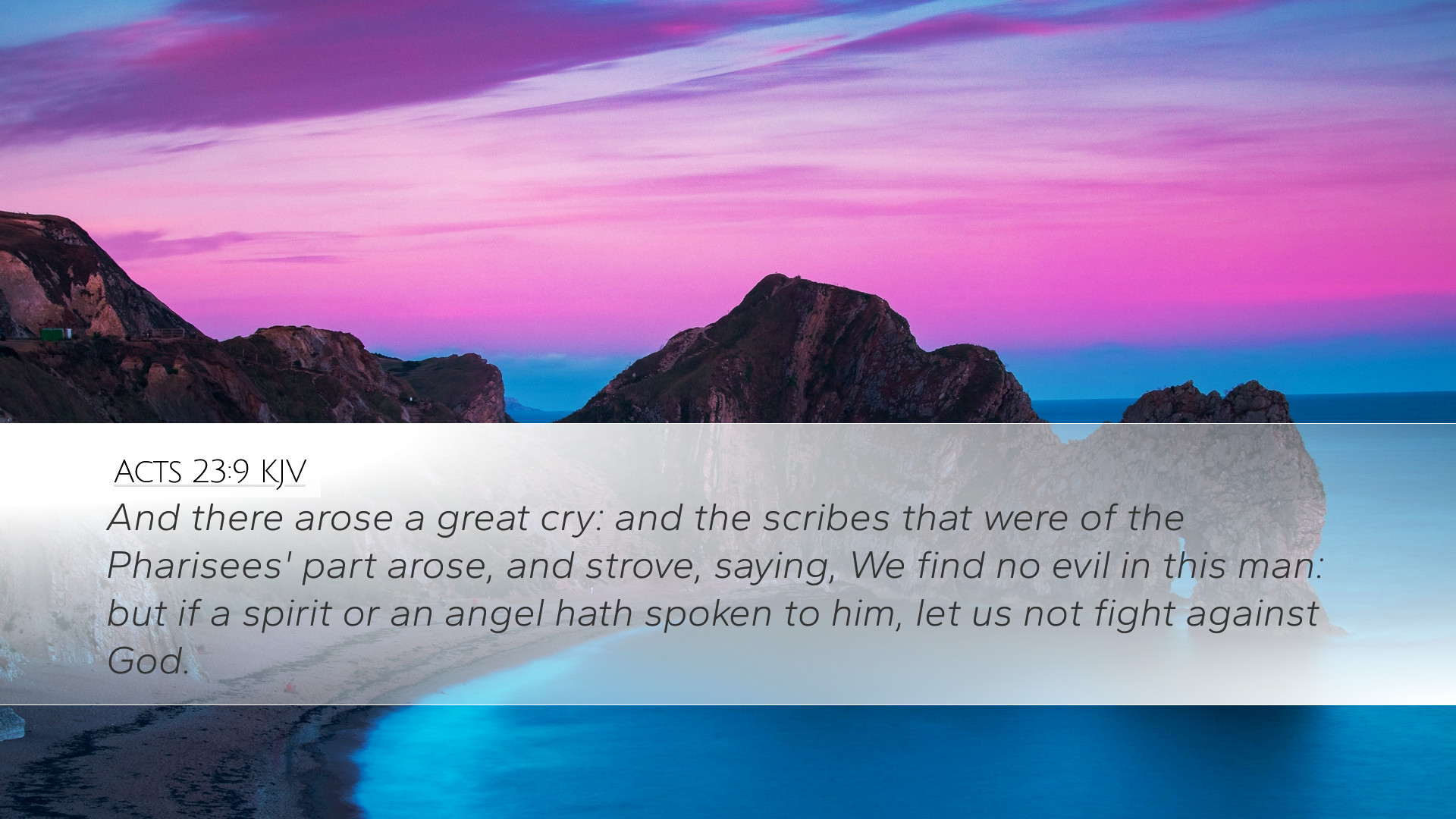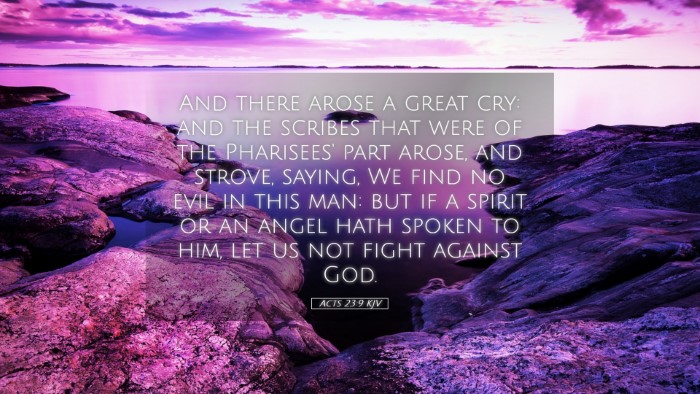Acts 23:9 - Commentary
Verse Text: "Then there arose a great cry: and the scribes that were of the Pharisees' part arose and strove, saying, We find no evil in this man: but if a spirit or an angel hath spoken to him, let us not fight against God."
Overview
Acts 23:9 presents a pivotal moment in the narrative of Paul's trial. It reveals the division among the Jewish factions—the Pharisees and Sadducees—concerning the resurrection and the nature of spiritual beings. The verse highlights the tensions of the early church's preaching in the midst of Jewish theological debates.
Commentary Insights
Matthew Henry's Commentary
Henry provides a reflection on the nature of the debates that once arose during the time of Christ and continued in the days of the apostles. He emphasizes how the resurrection became a central theme in Paul's defense and how he expertly navigated the divisions within Jewish leadership.
- Division Among the Jews: The Pharisees believed in the resurrection of the dead, while the Sadducees denied this doctrine. Paul cleverly used this schism by proclaiming his belief in the resurrection, which ignited a dispute among the council.
- Understanding the Cry: The 'great cry' denotes the chaos and disorder that ensued; it illustrates the intensity of the conflict in belief systems. Henry notes that this outcry serves as a manifestation of the spiritual battle between truth and falsehood within the religious elite.
- Testimony of the Pharisees: The Pharisaic declaration of Paul’s innocence carries significant weight, as it reflects a recognition of a higher authority that supersedes their current legal framework, acknowledging that divine intervention could be possible.
Albert Barnes' Notes on the Bible
Barnes focuses on the implications of the Pharisees’ defense of Paul and the theological context of the resurrection. He specifies that the rift provides an insight into the broader implications of the resurrection doctrine that was fundamental to early Christian preaching.
- Pharisaic Support: Barnes notes that the Pharisees’ affirmation of Paul indicates a willingness to embrace potential truths beyond their traditional interpretations. This support emphasizes a key aspect of the Christian message: the hope of resurrection.
- Implicature of 'Fighting Against God': The phrase 'let us not fight against God' highlights the danger of opposing divine will. Barnes emphasizes that the acknowledgment of divine communication is crucial, as it indicates a recognition that God’s purposes can extend beyond human understanding.
- Intervention and Faith: Barnes also stresses that such interventions by God invite believers to a deeper faith, reminding them that God often operates in ways beyond our consensus or human reasoning.
Adam Clarke's Commentary
Clarke elaborates on the cultural and theological ramifications of the events taking place. He examines the fervor of the crowd and the implications it had for the early church and its mission.
- The Role of Scribes: Clarke comments on the position of the scribes, particularly their influence in legal and theological matters. Their defense suggests a potential openness to the new movement represented by Paul.
- Resurrection as a Central Theme: He underscores that the resurrection is not merely doctrinal but pivotal to the identity of the church. The heated debate concerning this topic underscores its foundational importance to Christian faith.
- Awareness of Divine Activity: Clarke stresses the need for awareness of God's work in the midst of human conflict. The acknowledgment of spirits and angels speaks to the reality of spiritual warfare and divine intervention in human affairs.
Theological Implications
This passage encourages readers to consider the implications of belief systems and the power of resurrection within the Christian narrative. The division among the Pharisees and Sadducees serves as a microcosm of theological disagreements that persist today.
Key Takeaways for Pastors and Scholars
- Embrace Complexity: The complexities in theological beliefs encourage a well-rounded approach to scripture and pastoral care.
- Importance of Resurrection: Centrality of resurrection in Christian preaching cannot be understated; it is an anchor for faith.
- Divine Agency: Understanding that God's plans might unfold in unexpected ways enriches worship and faith practice.
- Encouragement Amid Conflict: The early church's experiences remind contemporary believers that conflicts can lead to deeper understandings and resolutions in faith.
Conclusion
The narrative in Acts 23:9 invites deep reflection on the nature of belief, the importance of resurrection, and the need for unity amidst diversities in faith. It challenges scholars, theologians, and pastors to engage with scripture actively and faithfully, recognizing the implications of their teaching in a complex and often divided world.


